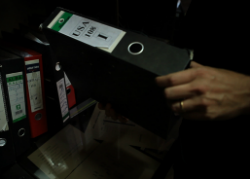
On September 6, Human Rights Watch released a report alleging that the U.S. government, under the Bush Administration, covered up the extent to which it used waterboarding at secret CIA prisons since the September 11, 2001 attacks. In particular, the report focuses on the CIA’s use of the tactic during the capture of Libyan opponents of Muammar Gaddafi before they were handed over to the former dictator’s secret police.
Waterboarding is an interrogation tactic. A victim lies on his back on an inclined platform, with his feet above his head, while water is poured into his nose and mouth. The victim begins to gag as his sinus cavities and mouth fill with water, leaving him unable to inhale or exhale without aspirating water.
According to the report, there is new evidence that the CIA used waterboarding on many more instances than previously admitted. “The scope of Bush administration abuse appears far broader than previously acknowledged and underscores the importance of opening up a full-scale inquiry into what happened,” said Laura Pitter, counterterrorism advisor at Human Rights Watch and author of the report.
“Delivered into Enemy Hands: US-Led Abuse and Rendition of Opponents to Gaddafi’s Libya,” the 154-page report, is based on interviews with individuals in Libya, including fourteen former individuals detained by the U.S. For example, a detainee described multiple instances of waterboarding while being held for interrogation. While the prisoner never used the phrase “waterboarding,” he described the tactic: his captors put a hood over his head, strapped him onto a wooden board, “then they start with the water pouring. . . . They start to pour water to the point where you feel like you are suffocating . . . they wouldn’t stop until they got some kind of answer from me.” This is just one example of many in the report.
It is widely accepted that waterboarding falls within the definitions of torture outlined in the UN Convention Against Torture, the Fourth Geneva Convention, and the Rome Statute of the International Criminal Court, making its use a violation of international law. However, only a few weeks ago, U.S. Attorney General Eric Holder announced that no criminal charges would be filed against CIA agents related to the use of waterboarding. Those responsible for U.S. foreign policy may tout respect for upholding the rule of law and for human rights, but until violations are enforced, there is no real respect for the prohibition on torture. Organizations like Human Rights Watch should continue to make these violations known until true accountability is achieved.
Brianna Evans is a 3L and the Editor-in-Chief of the Denver Journal of International Law and Policy.


